Premiere
"Read More" for Photos/Portraits/Fan Pics/Videos & Interviews
Photos:
Portraits:
Thank you to the wonderful people at kstewartfans for all the lovely pictures<3
Videos:
CXR Premiere Q&A
CXR Premiere Red Carpet
Leaving LA Times Media Ctr.
Access Hollywood
Associated Press
E! Online
Entertainment Weekly
Extra
HitFix
The Hollywood Reporter
MTV
On The Red Carpet
Red Carpet BA
Videos You Should See
WSJ Digital Network
Not since 'Panic Room' have we seen Kristen Stewart in a role where she goes into such a dark space. In her Sundance flick, 'Camp X-Ray,' she plays a prison guard who befriends a detainee. “My character felt destroyed from the inside out,” she said. “I don’t know what it’s like to play a prison guard, but that was my approach."
LA Times
It is, Kristen Stewart agrees, just like falling in love.
"It's just a very familiar, necessary feeling when you read a script you want to do," the actress says, coming alive at just the memory. "I've gone with my gut, taken a lot of the thinking away, and been very lucky.
"As an artist," she continues, her energy rising, "If you view what you do as product, you'll never do anything true to yourself, never do anything you're proud of. I've never thought, 'My career should go in this direction.' There's no way to be tactical for me."
Stewart got that familiar feeling when she read writer-director Peter Sattler's script for "Camp X-Ray," which has its debut Friday as part of the Sundance Film Festival's dramatic competition.
A quietly involving drama, part character study, part meditation on the nature of shared humanity, "Camp X-Ray" is powered by Stewart's focused, convincing performance as Cole, a young Army guard at Guantanamo who makes a connection with a prisoner played by Payman Maadi, the star of Iran's Oscar-winning "A Separation."
"It had been two years since I worked, but it wasn't my choice to take a break," the 23-year-old actress says, sitting in a Sunset Boulevard conference room a few days before the festival began. "But nothing had given me that compulsion, nothing that made me feel it was meant for me to do."
Even though "Camp X-Ray" was "a tiny little movie, a million-dollar budget, five-week shooting schedule," Stewart responded to it at once. "The character seemed so whole to me," she says, "it was very emotional and a genuine fresh perspective on something current. It had everything I look for in a project."
Once Stewart committed, she was all in, reading extensively, watching films, talking to people who filled her in on the military mind-set. "I developed a back story for Cole, I know her father, her mother, I can tell you anything about that girl," she says. "It's important to be a real person, not a representation."
Stewart is also always on the lookout for what she calls "footholds, touchstones, little details that communicate to an audience, that make things evident without being heavy-handed."
To express Cole's uncertainty, for instance, the character wears tube socks and sandals on a day off, "trying to be cool but missing the mark." Even more vivid is the way Cole attacks her long hair, forcing it into the most precise bun imaginable.
"She takes her long hair and binds it, oppresses the … out of it," Stewart says. "These buns are a reflection of the soldier, and Cole's is perfection. The only moments she feels confident is when she is in uniform."
Stewart is also always on the lookout for what she calls "footholds, touchstones, little details that communicate to an audience, that make things evident without being heavy-handed."
To express Cole's uncertainty, for instance, the character wears tube socks and sandals on a day off, "trying to be cool but missing the mark." Even more vivid is the way Cole attacks her long hair, forcing it into the most precise bun imaginable.
"She takes her long hair and binds it, oppresses the … out of it," Stewart says. "These buns are a reflection of the soldier, and Cole's is perfection. The only moments she feels confident is when she is in uniform."
Even doing all this work doesn't stop the pre-production anxiety that is part of Stewart's experience. Though in person she is aware, lively and engaging, the actress says that "there is a scary thing about signing on to a project that feels ambitious: 'Can you stand up to it?' is the fear. I don't want to ruin a brilliant script. I give a disclaimer to every director I work with: I will do anything, I will jump off buildings, but I don't know if I will be able to deliver what you want."
That fiercer than fierce commitment to the part can also manifest itself during production. On "Camp X-Ray" Stewart is processing what happened during the shooting of the film's climactic emotional scene between guard and prisoner. It was a scene in which director Sattler made the decision to start with costar Maadi's coverage, with Stewart playing the scene off camera rather than the other way around, which the actress would have preferred.
That fiercer than fierce commitment to the part can also manifest itself during production. On "Camp X-Ray" Stewart is processing what happened during the shooting of the film's climactic emotional scene between guard and prisoner. It was a scene in which director Sattler made the decision to start with costar Maadi's coverage, with Stewart playing the scene off camera rather than the other way around, which the actress would have preferred.
"I am such a weirdo freak of an actor that I can't repeat anything, and Maadi has done a lot of theater, he likes to do a scene over and over," she says. Not having her first reactions on camera "made me hysterical, at the end of the day I sat in the cellblock crying, I was just done. I was so anxious to have that experience. Looking back on it now, it still makes me crazy, I want to bang my head through the table."
An established independent film actor before she took on the role of Bella Swan, Stewart is relieved to find the frenzy around the "Twilight" series starting to abate.
"It was crazy, it reached insane levels," she says, still a bit disbelieving. "People would ask about maintaining that and I said, 'Everyone take a breath. That is not going to happen.' There is no way you could ever want to stay at that level."
Smiling and saying that her "Twilight" experience "has given me a unique perspective on the world, that's the positive way of looking at it," Stewart wonders why it is sometimes difficult for others to realize that it was her unmistakable passion for the work and not a zeal for celebrity that led her to acting.
"It's not easy for people to understand my discomfort with the spotlight, they say, 'Why would you become an actor if you feel that way?'" Stewart says. "People don't know what to do with those feelings, they feel you're ungrateful, and that does kind of kill me.
"You can't be saying, 'You're wrong about me,' the worst thing is if you remotely sound like you're complaining. Then you become the misconception." All you can do, Kristen Stewart realizes, is to continue to do the work, and that's what she has done.
Kristen Stewart found common ground between herself and the taciturn Guantanamo Bay Marine guard she played in Camp X-Ray, which premiered Friday at the Sundance Film Festival.
An established independent film actor before she took on the role of Bella Swan, Stewart is relieved to find the frenzy around the "Twilight" series starting to abate.
"It was crazy, it reached insane levels," she says, still a bit disbelieving. "People would ask about maintaining that and I said, 'Everyone take a breath. That is not going to happen.' There is no way you could ever want to stay at that level."
Smiling and saying that her "Twilight" experience "has given me a unique perspective on the world, that's the positive way of looking at it," Stewart wonders why it is sometimes difficult for others to realize that it was her unmistakable passion for the work and not a zeal for celebrity that led her to acting.
"It's not easy for people to understand my discomfort with the spotlight, they say, 'Why would you become an actor if you feel that way?'" Stewart says. "People don't know what to do with those feelings, they feel you're ungrateful, and that does kind of kill me.
"You can't be saying, 'You're wrong about me,' the worst thing is if you remotely sound like you're complaining. Then you become the misconception." All you can do, Kristen Stewart realizes, is to continue to do the work, and that's what she has done.
USA Today
Kristen Stewart found common ground between herself and the taciturn Guantanamo Bay Marine guard she played in Camp X-Ray, which premiered Friday at the Sundance Film Festival.
"She had aspects that I have and that I really felt," said Stewart of Pvt. Amy Cole, assigned to guard the detainees held for years at Guantanamo Bay. The film is a fictional story about a friendship that develops between Cole and Ali, a suspected terrorist imprisoned on the U.S. Naval base since shortly after Sept. 11, 2001.
Stewart spoke of portraying someone not so different from herself, presumably in contrast to playing a teenager in love with a vampire in the Twilight movies.
When asked about her experiences filming, she joked: "I forgot how to turn left. I was constantly rotating," referring to her character doing rounds in a small cellblock, often pushing a cart of library books.
On a more serious note, she spoke of the importance of preparation for the role.
"Rehearsal was very necessary," she said. "Luckily there's a lot of material [for research]. There are multiple documentaries we watched. There were memoirs written on both sides of the coin. And then I hung out with this really awesome Marine for three days and learned things in a very accelerated way."
Among them, how to stand and walk like a Marine.
Stewart spoke of portraying someone not so different from herself, presumably in contrast to playing a teenager in love with a vampire in the Twilight movies.
When asked about her experiences filming, she joked: "I forgot how to turn left. I was constantly rotating," referring to her character doing rounds in a small cellblock, often pushing a cart of library books.
On a more serious note, she spoke of the importance of preparation for the role.
"Rehearsal was very necessary," she said. "Luckily there's a lot of material [for research]. There are multiple documentaries we watched. There were memoirs written on both sides of the coin. And then I hung out with this really awesome Marine for three days and learned things in a very accelerated way."
Among them, how to stand and walk like a Marine.
"He literally showed me how to walk," said Stewart. "It's not like a physically strenuous role, but it should be clear I have training -- even though I just walk around in circles."
As key as her ramrod-straight posture was, it also was necessary to delve into her character's internal state.
"What was important to me was figuring out who she was," Stewart said.
When asked further about the role, she deferred to her co-star, Payman Maadi, who plays Ali.
"What was important to me was figuring out who she was," Stewart said.
When asked further about the role, she deferred to her co-star, Payman Maadi, who plays Ali.
"You're so charismatic," she said to him.
Maadi cheerfully took the cue. "We rehearsed for like a week. It was just like theater rehearsals for us. We shared a lot of ideas. It was very important to get the vibe.
"We did another thing: Some of us stayed in cells. We asked to be locked up. I stayed there for a couple of hours."
Maadi cheerfully took the cue. "We rehearsed for like a week. It was just like theater rehearsals for us. We shared a lot of ideas. It was very important to get the vibe.
"We did another thing: Some of us stayed in cells. We asked to be locked up. I stayed there for a couple of hours."
Added Camp X-Ray writer-director Peter Sattler: "We just left him there."
Maadi quipped: "I just came out for this. I'll go back."
Sattler said he sought to approach the story from a personal, not political, angle.
"I've always been attracted to small stories about big things," Sattler said. "Guantanamo Bay is a weird subject. It is fraught with all sorts of prickly things to tiptoe around. Because there's so much propaganda surrounding it, from the beginning we really wanted to make a movie that was not propaganda at all, one that didn't tell you what to think, but just kind of presented a very human story."
The idea derived from an image he saw in a documentary in which a detainee and a guard were talking about books on a nearby cart.
"I thought, 'Wow, what if you just did this kind of two-hander, one-room type of movie where these two characters just talk? What would these two people talk about? What would their relationship be like? It seemed like a cool way to address Guantanamo Bay indirectly. It's not about Guantanamo Bay, but we can still kind of touch on the subject. "














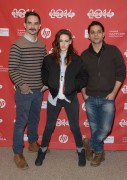





















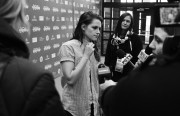

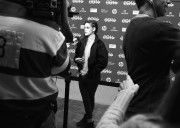









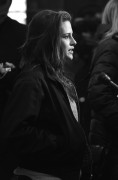

















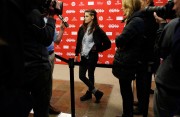




























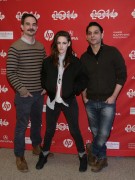
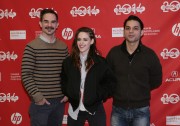


























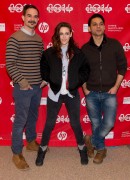








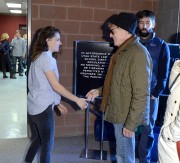














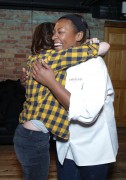














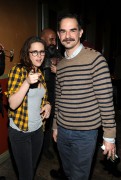


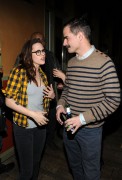






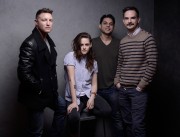

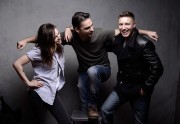







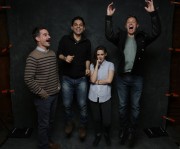


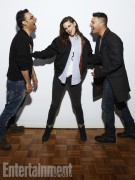



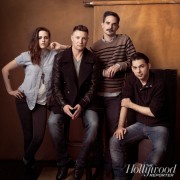






















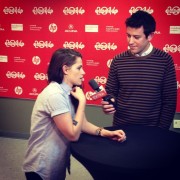







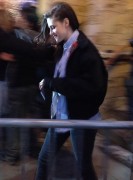







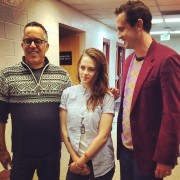





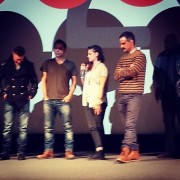











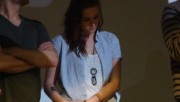



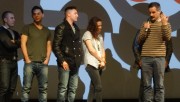









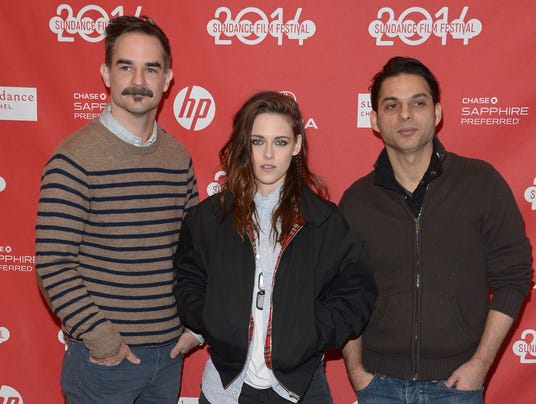
No comments:
Post a Comment
What do you think of this?